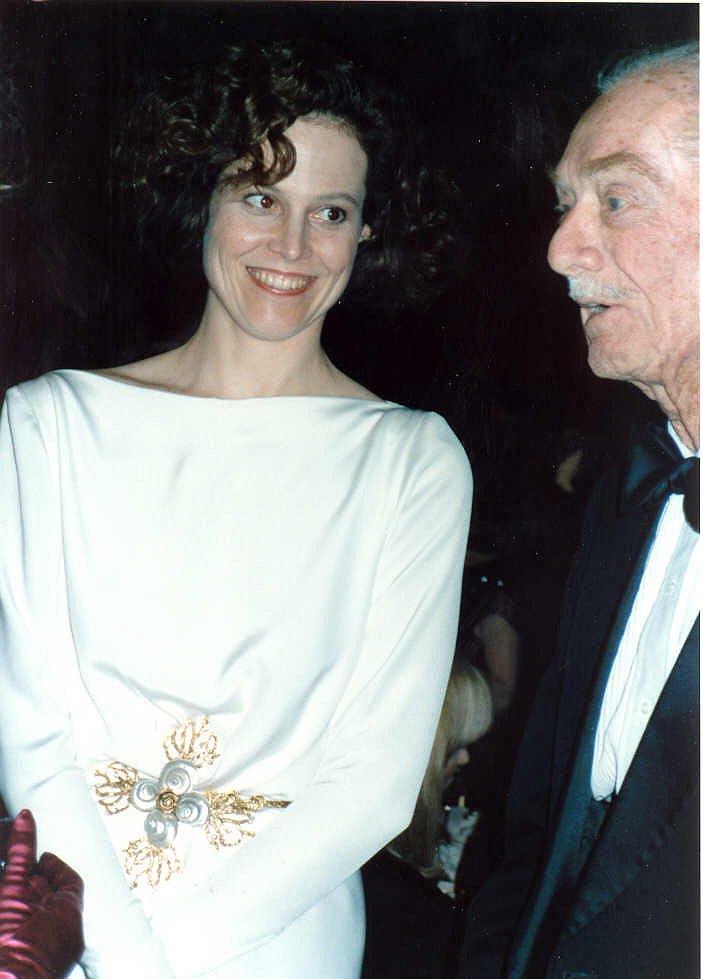- Pat Weaver
Infobox Person
name = Pat Weaver

caption = Pat Weaver with his daughterSigourney Weaver
birth_name = Sylvester Laflin Weaver Jr.
birth_date = birth date|1908|12|21
birth_place =Los Angeles, California
death_date = death date and age|2002|3|17|1908|12|21
death_place =Santa Barbara ,California , U.S.
spouse = Elizabeth Inglis (1942-2002)
children = Trajan WeaverSigourney Weaver (b.1949)Sylvester Laflin "Pat" Weaver, Jr. (
December 21 ,1908 –March 17 ,2002 ) was a former radio advertising executive who was president ofNBC between 1953 and 1955. He has been credited with reshaping broadcasting's format and philosophy as radio gave way to television as America's dominant home entertainment.Personal
Weaver was the son of Sylvester Laflin Weaver, Sr. (1876-1956) and Miranda Dean Weaver (February,
1877 -March 21 ,1961 ). He was the brother of comedianDoodles Weaver . He graduated fromDartmouth College in 1930, where he was a member ofPhi Beta Kappa andPhi Kappa Psi Fraternity.He married Elizabeth Inglis, and the couple had two children: actress
Sigourney Weaver (born Susan Alexandra Weaver) and Trajan Weaver.Career
Weaver worked for the
Young & Rubicam advertising agency during thegolden age of radio . In the mid-1930s he producedFred Allen 's "Town Hall Tonight" radio show, and he then supervised all the agency's radio programming. NBC hired him in 1949 to challenge theCBS network's programming lead.At NBC, Weaver established many operating practices that became standard for network television. He introduced the practice of networks producing their own television programming, then selling advertising time during the broadcasts. Prior to that, ad agencies usually created each show for a particular client. Because commercial announcements could now more easily be sold to more than one company sponsor for each program, a single advertiser pulling out would not necessarily threaten a program.
Weaver created "Today" in 1952, followed by "Tonight" (1954) with Steve Allen, "Home" (1954) with
Arlene Francis and "Wide Wide World " (1955), hosted byDave Garroway .He believed so deeply that broadcasting should educate as well as entertain that he typically required NBC shows to include at least one sophisticated cultural reference or performance per installment—including a segment of a Verdi opera adapted to the comic style of
Sid Caesar andImogene Coca 's groundbreaking "Your Show of Shows ".Weaver didn't ignore NBC Radio, either. In 1955, as network radio was dying, Weaver gave it one of the greatest adrenaline kicks in its history with "NBC Monitor", a weekend-long magazine-style programming block that featured an array of news, music, comedy, drama, sports, and anything that could be broadcast within magazine style, with rotating advertisers and some of the most memorable names in broadcast journalism, entertainment, and sports.
"NBC Monitor" long outlived Weaver's tenure running the network. Following disputes with chieftain
David Sarnoff , Weaver departed. His ideas were either too expensive or toohighbrow for company tastes. His successors (first, Sarnoff's son, Robert; then, Robert Kintner) standardized the network's programming practices with far less of the ambitiousness that characterized the Weaver years.External links
* [http://www.museum.tv/archives/etv/W/htmlW/weaversylve/weaversylve.htm The Museum of Broadcast Communications (formal bio)]
* [http://www.televisionheaven.co.uk/patweaver.htm Television Heaven (brief bio)]
* [http://www.ciadvertising.org/student_account/fall_01/adv382j/howardmo/practitioner.html Pat Weaver: Television Advertising Visionary (biographical essay)]
* [http://www.monitorbeacon.com/patweaver.html "NBC (Radio) Monitor" tribute]References
Wikimedia Foundation. 2010.
